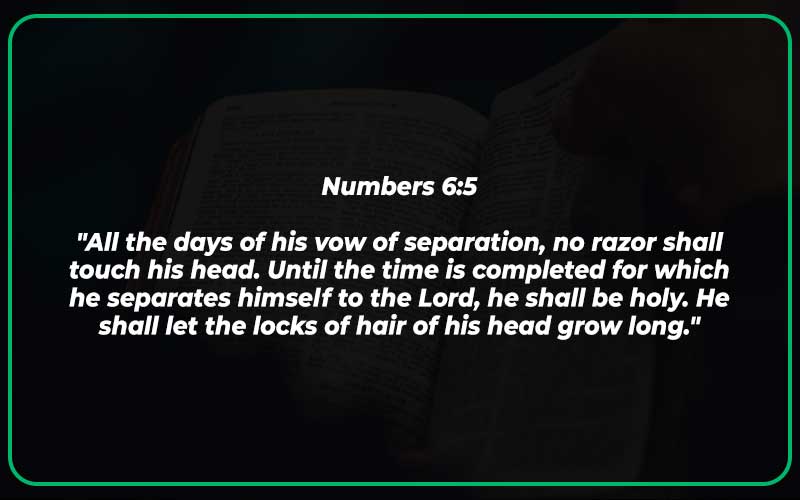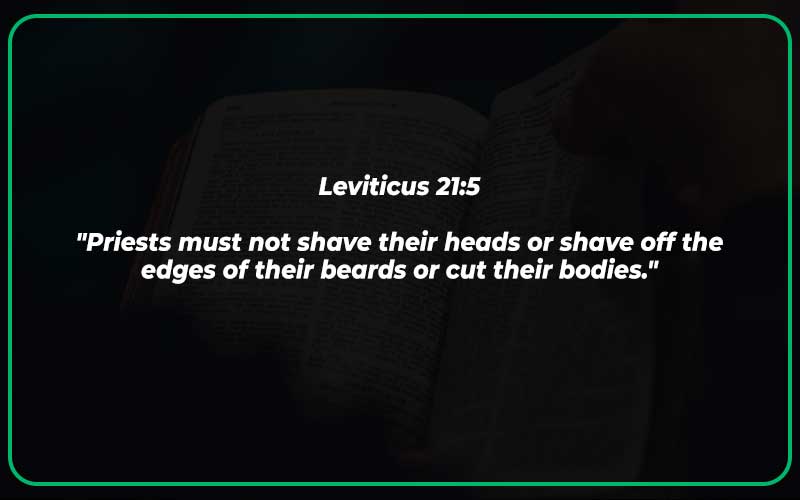Do you know that the Bible talks about cutting hair? Within the Bible, there are several verses that discuss hair cutting and the importance of doing so in certain circumstances.
Today, we will explore some fascinating Bible verses about cutting hair and discuss how these verses can apply to our lives today.
Bible Verses About Cutting Hair
1 Corinthians 11:14-15
“Does not nature itself teach you that if a man wears long hair, it is a disgrace for him, but if a woman has long hair, it is her glory? For her hair is given to her for a covering.”
In these verses, Paul appeals to cultural norms of the Corinthian society to discuss order and propriety in worship. He contrasts between men’s and women’s hair length. However, it’s crucial to note the cultural and temporal specificity of these comments. They may not apply in societies where men’s long hair isn’t seen as disgraceful.
Numbers 6:5
“All the days of his vow of separation, no razor shall touch his head. Until the time is completed for which he separates himself to the Lord, he shall be holy. He shall let the locks of hair of his head grow long.”
In the context of Nazarite vows, this verse highlights how hair was a symbol of dedication to God. Nazarites refrained from cutting their hair to signify their vow’s duration. Thus, hair length became a physical representation of spiritual commitment, not an inherent virtue or vice.

Judges 16:17
“He told her all his heart, and said to her, ‘A razor has never come upon my head, for I have been a Nazirite to God from my mother’s womb. If my head is shaved, then my strength will leave me, and I shall become weak and be like any other man.'”
Samson’s story provides a vivid illustration of the Nazarite vow. His uncut hair symbolized his unique strength and devotion to God. The cutting of Samson’s hair isn’t fundamentally about the act of cutting hair but the breach of the Nazarite vow and the loss of divine favor and power.
Ezekiel 5:1
“And you, O son of man, take a sharp sword. Use it as a barber’s razor and pass it over your head and your beard. Then take balances to weigh and divide the hair.”
In this vivid metaphor, Ezekiel uses hair cutting to symbolize God’s impending judgment on Jerusalem. The cut and divided hair represented the divided fate of the people — some would perish by pestilence, some by the sword, and others would be scattered.
2 Samuel 14:26
“And when he cut the hair of his head (for at the end of every year he used to cut it; when it was heavy on him, he cut it), he weighed the hair of his head, two hundred shekels by the king’s weight.”
Absalom’s hair cutting was an annual event and his thick, heavy hair was seen as a mark of distinction. The weight of his hair is given to demonstrate his vanity and pride, key aspects of his character which ultimately led to his downfall.
Also Read: 27 Don’t Let Anyone Steal Your Joy Bible Verses (With Commentary)
Leviticus 19:27
“You shall not round off the hair on your temples or mar the edges of your beard.”
This Old Testament law was part of distinctive living practices for Israelites, setting them apart from surrounding nations. The prohibition against cutting hair in certain ways likely aimed to prevent the adoption of pagan customs. It’s less about haircuts and more about maintaining cultural and religious distinctiveness.
1 Corinthians 11:6
“For if a woman does not cover her head, she might as well have her hair cut off; but if it is a disgrace for a woman to have her hair cut off or her head shaved, then she should cover her head.”
In Paul’s first letter to the Corinthians, he discusses cultural customs of veiling and unveils implications about honor and disgrace. The message isn’t inherently about hair cutting but rather respecting community standards and not causing distractions during worship.
Luke 7:38
“As she stood behind him at his feet weeping, she began to wet his feet with her tears. Then she wiped them with her hair, kissed them and poured perfume on them.”
This verse doesn’t mention hair cutting, but it illustrates the deep significance of hair in biblical times. The woman’s act of using her hair to wash Jesus’s feet was a profound gesture of reverence, demonstrating the symbolic and practical importance of hair.
Acts 18:18
“Paul stayed on in Corinth for some time. Then he left the brothers and sisters and sailed for Syria, accompanied by Priscilla and Aquila. Before he sailed, he had his hair cut off at Cenchreae because of a vow he had taken.”
In this verse, the act of Paul cutting his hair symbolizes the completion of a vow, likely a Nazirite vow. His decision to cut his hair signifies the conclusion of his dedicated period and doesn’t imply a universal mandate for hair length or style.
Numbers 6:18
“The Nazirite is to shave his consecrated head at the entrance to the tent of meeting, and take the hair and put it in the fire that is under the sacrifice of the fellowship offering.”
This verse provides further insight into the Nazirite vow. When the period of the vow was complete, the Nazirite would shave their head, marking a significant transition. The shaved hair was then offered as a sacrifice, underscoring the sacredness of the commitment.
Acts 21:24
“Take these men, join in their purification rites and pay their expenses, so that they can have their heads shaved. Then everyone will know there is no truth in these reports about you, but that you yourself are living in obedience to the law.”
Here, Paul is asked to support men who are completing Nazarite vows. The act of shaving their heads is a ceremonial rite marking the end of their vows. This demonstrates that hair cutting can have religious significance and meaning beyond aesthetics.
Leviticus 21:5
“Priests must not shave their heads or shave off the edges of their beards or cut their bodies.”
This commandment from Leviticus explicitly prohibits Israelite priests from shaving their heads, again as a part of establishing distinctive cultural practices. This likely served to separate them from pagan practices. The emphasis is on the symbolic and spiritual dimensions of physical appearance.

Deuteronomy 14:1
“You are the children of the LORD your God. Do not cut yourselves or shave the front of your heads for the dead,”
In this verse, the prohibition of cutting hair is related to mourning practices of surrounding cultures. The Israelites are encouraged to express their grief without resorting to pagan practices like hair cutting or self-mutilation, affirming their identity as God’s chosen people.
Ezekiel 44:20
“They must not shave their heads or let their hair grow long, but they are to keep the hair of their heads trimmed.”
In the context of future temple worship, this verse instructs priests to maintain a moderate hair length – neither shaved nor grown long. This perhaps represents a balance between adherence to holiness and avoidance of practices associated with pagan cults.
Jeremiah 7:29
“Cut off your hair and throw it away; take up a lament on the barren heights, for the LORD has rejected and abandoned this generation that is under his wrath.”
Jeremiah uses the imagery of cutting hair to symbolize the impending disaster and rejection by God. It’s a sign of mourning and despair, showcasing how hair can be used metaphorically in the Bible.
Jeremiah 16:6
“Both high and low will die in this land. They will not be buried or mourned, and no one will cut himself or shave his head for the dead.”
In this verse, the customary mourning practices, including hair cutting and shaving, are suspended as a sign of God’s severe judgement. This underscores that the act of cutting hair can have specific cultural and religious significance, beyond simple aesthetics.
Jeremiah 41:5
“eighty men who had shaved off their beards, torn their clothes and cut themselves came from Shechem, Shiloh and Samaria, bringing grain offerings and incense to the house of the Lord.”
In this verse, the act of shaving beards and cutting themselves are seen as signs of extreme grief and mourning. These physical changes were expressive actions intended to demonstrate internal emotional states.
Also Read: 23 Bible Verses About Finding Yourself (With Commentary)
Ezekiel 7:18
“They will put on sackcloth and be clothed with terror. Their faces will be covered with shame and their heads will be shaved.”
In this prophecy about the impending doom of Jerusalem, Ezekiel describes the inhabitants’ reactions. Shaving of heads, a sign of despair and mourning, illustrates the deep distress the people would experience.
Job 1:20
“Then Job arose, and rent his mantle, and shaved his head, and fell down upon the ground, and worshipped.”
In Job’s story, shaving his head is an expression of immense grief following the loss of his children and wealth. Despite his personal anguish, Job’s faith remains unshaken, demonstrating his unwavering commitment to God.
Isaiah 3:24
“Instead of fragrance there will be a stench; instead of a sash, a rope; instead of well-dressed hair, baldness; instead of fine clothing, sackcloth; instead of beauty, branding.”
Here, Isaiah is predicting the downfall of the daughters of Zion, with the beauty of well-dressed hair being replaced by baldness. This acts as a metaphor for the drastic societal transformation and degradation that would result from their actions.

What does the Bible say About Cutting Hair?
In the Bible, there are several references to hair and its cultural significance in ancient times. One notable passage is found in 1 Corinthians 11:14-15 (New Testament), where Paul discusses the practice of head coverings. He suggests that long hair is a natural covering for a woman and that it is her glory. However, he doesn’t explicitly prohibit cutting hair.
In the Old Testament, there are instances of individuals taking vows of Naziriteship, as seen with Samson. As part of this vow, a Nazirite would refrain from cutting their hair (Numbers 6:1-21). This was a specific religious vow and not a general commandment for all believers.
Overall, the Bible doesn’t provide explicit commands regarding the length or cutting of hair for regular Christians. The verses mentioned above reflect cultural norms and specific religious practices in ancient Israel. In modern times, interpretations and practices regarding hair are often guided by individual and cultural preferences, rather than strict biblical mandates.
Final Thoughts
The Bible has many verses that offer us guidance about cutting our hair. Whether it’s about following the Levitical laws or just general guidance for being modest, these verses remind us to be mindful of our appearance and to honor God in all that we do.
We can take the greater lessons of these verses and apply them to all aspects of our lives as we strive to follow God’s will and glorify Him through our lives.

